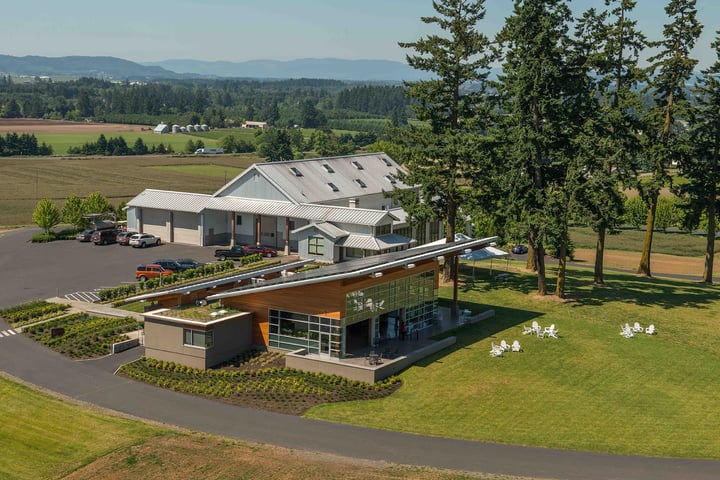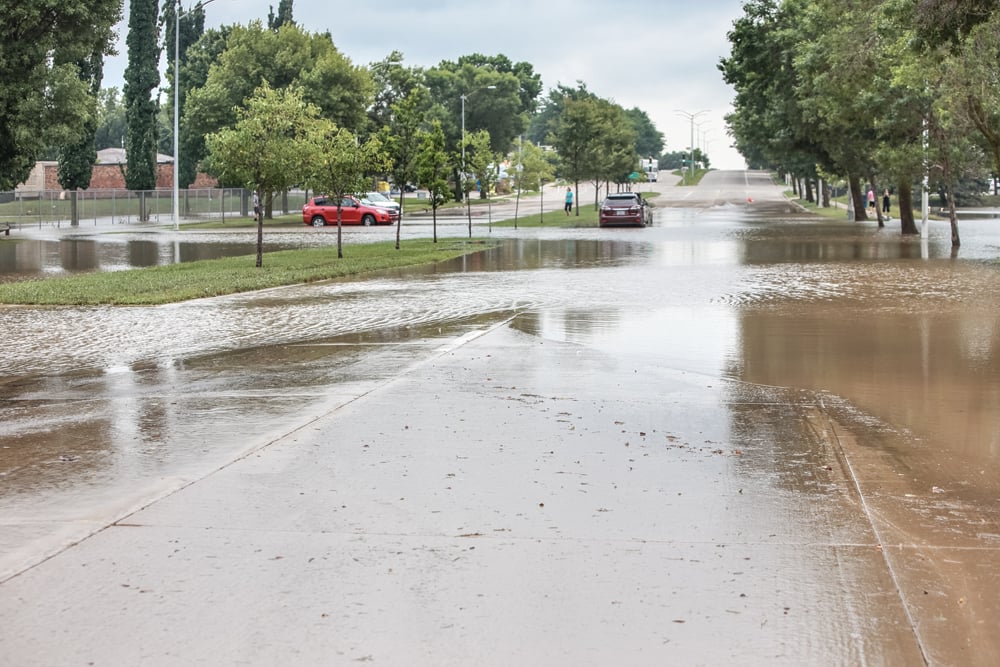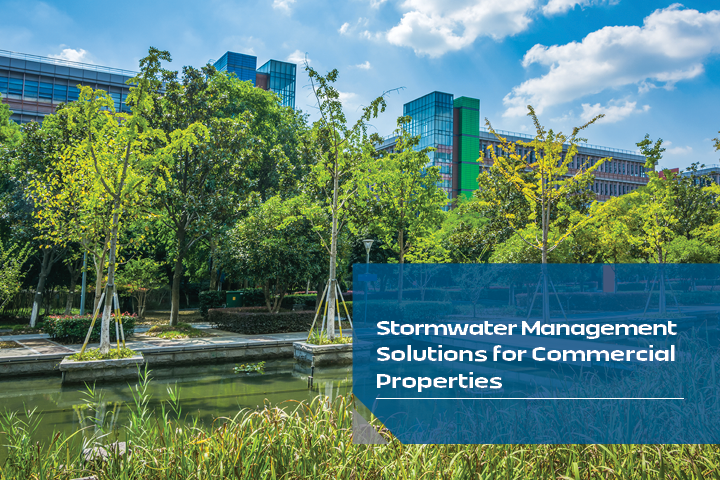
Rainwater runoff and melting snow don’t often cause problems, but too much reaching streets and commercial properties can lead to serious, even dangerous issues, making commercial stormwater management absolutely critical.
Here is what you need to know about stormwater management and how best practices can prevent damage to your commercial property.
What is Stormwater Management?
Stormwater management is the practice of creating effective drainage and pathways that allow stormwater to safely run away from roads, commercial properties, homes, and other areas that may suffer damage should it build up. This process also includes containing stormwater and removing pollutants.
This can involve large-scale tactics, such as dykes or floodways, as well as smaller-scale methods, like drainage installation, grading, and other considerations, like awnings and eavestroughs.
Why Stormwater Management is Important

The major risks of poorly managed stormwater include property damage, eroded roadways and paths, and unsafe conditions for people, wildlife, and the environment.
Without some way to manage stormwater, streets, sidewalks, parking lots, and even landscaped areas can flood, which can lead to damaged property, vehicular accidents, and injuries.
Water from flooding can also get into cracks in the asphalt and freeze in colder months, causing it to expand and worsen. When landscaped areas flood, it can ruin the landscaping and lead to soil erosion that is costly to repair.
Even without flooding, stormwater runoff still ends up on roads, parking lots, and other similar areas. It collects things like residual car oil, trash left on the ground, and other harmful debris. If these contaminants make it into the stormwater system, it can be harmful, as this water is typically redirected back to lakes, rivers, and streams.
This hurts both aquatic and land-based wildlife, but that isn't all. Some of that water goes to water treatment plants to become the water that people use every day. If contaminated water gets passed into these systems, it can prove extremely harmful to humans.
Beyond that, if there is no way to manage stormwater in place, it can cause other types of damage, including harm to a building's structure. If water remains too close to the building, it can penetrate the roof or foundation, leading to structural and mold issues.
Stormwater Management Solutions
To prevent property damage, injury, and other issues, proper stormwater management techniques must be observed. The following are some of the most common stormwater management best practices that are absolutely vital to your commercial property’s longevity.
Ensure Proper Grading
When the ground is flat, it leaves water runoff sitting in the same spot with nowhere to go, especially on nonporous surfaces, such as concrete and asphalt. Standing water can lead to large puddles, which can cause soil erosion and even asphalt damage, as well as slipping hazards in the colder months.
Ensuring the ground has the proper grading or slope in the right direction is key; water should be able to flow away from any structures and towards drain systems. This will protect the property and ensure there is no standing water.
Water will always take the path of least resistance, with gravity as its driving force, so use this to your advantage when grading.
Make Sure Buildings Have Gutter Systems
Gutters or eavestroughs are used to divert stormwater away from a building or structure. Gutters ensure that stormwater runoff does not end up close to the building's perimeter, where it can penetrate and damage the foundation and surrounding landscaping.
Having a gutter system in place is critical, but it also requires maintenance. If your gutter screws or other hardware are faulty or not maintained, it can compromise the system causing leakage. If it becomes clogged with leaves, then it will not function properly, and any runoff will be unable to drain. Ensuring the system is installed properly and kept free from debris will allow it to work and divert excess water runoff towards the drainage or sewer system.
Invest in Quality Drainage
.png?width=1600&name=Project%20Spotlight%20CalPoly%20Winery-1%20(1).png)
An effective drainage system is the best piece of equipment you can install to aid in all of your stormwater management efforts. Grading and gutters will take water away from your property, but sending it into a proper drainage channel and on toward a sewer system completes your efforts.
Slot Drain, for example, is a modern trench system that can blend in seamlessly with the surrounding landscaping, while eliminating the need for heavy, troublesome grate covers, like the ones you see on traditional trench drains.
All Slot Drain systems come pre-sloped, providing an easy installation process and ensuring that water is not left standing in the channel. The stainless steel models are resistant to corrosion, extreme temperatures, odors, and even bacteria, which significantly cuts down on wear and tear, saving you money in the long run.
The 6000 Series and 7000 Series Slot Drains are commercial-grade systems with a Load Class C distinction. They are easy to maintain, both manually and with automated cleaning options like Slot Drain Systems’ proprietary Flush-Flo system.
Create a Rain Garden
One of the more creative stormwater management solutions to consider is creating a rain garden, also called a bioretention system. These are gardens designed to capture water runoff through a mixture of landscaping and carefully chosen plants, which will absorb excess water rather than allowing it to flow directly into any stormwater systems.
These not only help with the management of stormwater but can act as attractive landscaping for commercial properties.
Manage Your Stormwater More Effectively
Stormwater runoff cannot be stopped or prevented, though it can be managed more efficiently. With the proper stormwater management solutions in place, stormwater issues can be significantly minimized, if not eliminated. Otherwise, there is a risk of stormwater runoff causing various types of damage, both seen and unseen.
By taking measures to manage this runoff, commercial properties can remain safe, stable, and sanitary for everyone.
Need help with drainage?
Take a step towards a more practical stormwater management approach and contact a Slot Drain Systems drainage expert today.


